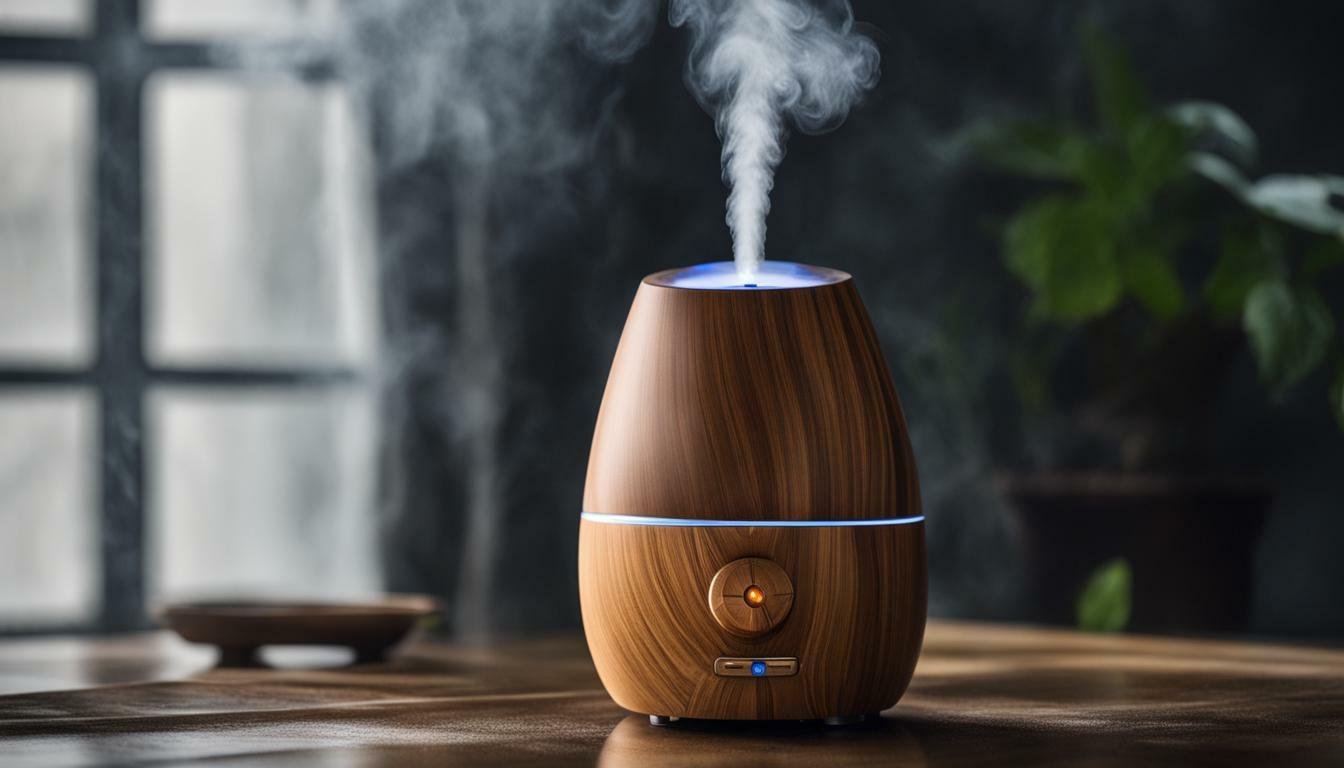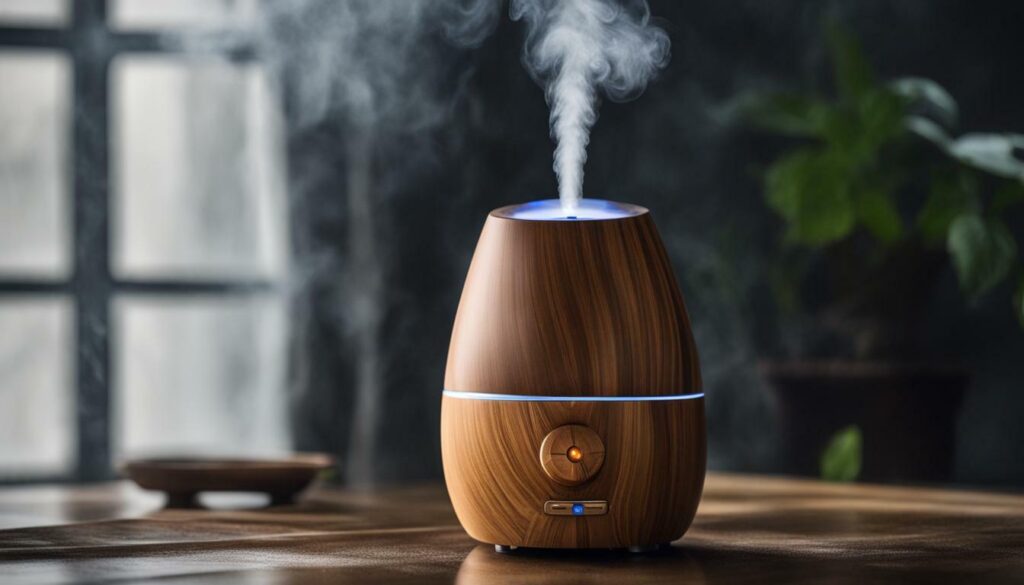
If you’ve noticed a musty smell coming from your essential oil diffuser, you’re not alone. There are a few reasons why this might be happening. One common cause is not cleaning the diffuser regularly enough, which can lead to a buildup of oils and water inside. Another factor to consider is using too much oil in each session, which can leave a residue that contributes to the bad smell. Additionally, some essential oils may be more potent and can cause the diffuser to emit an unpleasant odor if used too frequently.
To address this issue, it’s important to clean your diffuser regularly. You can use methods such as using a mixture of water and white vinegar, rubbing alcohol, or lemon juice to effectively remove any buildup and eliminate the musty smell. It’s also crucial to use the correct amount of oil in your diffuser, following the recommended oil-to-water ratio. If a particular oil is causing a bad smell, consider switching to a different oil to avoid this problem.
By maintaining regular cleaning practices, using the correct amount of oil, and being mindful of the oils you use, you can keep your essential oil diffuser smelling fresh and pleasant. Taking these simple steps will ensure that you can fully enjoy the benefits of aromatherapy without any unwanted odors.
Importance of Regular Cleaning
Proper maintenance and regular cleaning are crucial to ensuring your essential oil diffuser remains fresh and free from musty odors. When left uncleaned, your diffuser can accumulate a buildup of oils and water, resulting in a less than pleasant scent when in use.
To combat this issue, it is recommended to clean your diffuser at least once a week, or more frequently if you use it daily. The good news is that cleaning your diffuser is relatively simple and can be done using common household ingredients.
One effective method is to mix equal parts water and white vinegar, then fill your diffuser halfway and let it run for about 5-10 minutes. Afterward, empty the diffuser, wipe it dry, and use a cotton swab to clean any stubborn residue. Alternatively, you can also use rubbing alcohol or lemon juice instead of white vinegar.
By regularly cleaning your essential oil diffuser, you not only remove any existing musty smells but also prevent them from occurring in the future. This simple maintenance routine will ensure that your diffuser continues to provide you with the aromatic benefits you enjoy, without any unwanted odors.
| Benefits of Regular Cleaning |
|---|
| Prevents musty odors |
| Preserves the integrity of essential oils |
| Enhances the diffusion and dispersal of aroma |
| Improves the lifespan of your diffuser |
Impact of Using Too Much Oil
While it may be tempting to add more oil for a stronger scent, using too much oil can have an unintended consequence – a musty smell emanating from your diffuser. When an excess amount of oil is used, it can leave behind a residue that accumulates inside the diffuser. Over time, this residue can lead to a buildup of bacteria, mold, and mildew, resulting in an unpleasant odor.
To prevent this issue, it’s important to follow the recommended oil-to-water ratio. Most diffusers suggest adding a few drops of essential oil to a certain amount of water, typically around 100 milliliters. This ensures that the diffuser functions properly and helps to distribute the scent evenly without overwhelming the space.
If you find that your diffuser is emitting a musty smell, it’s a sign that you may be using too much oil. Try reducing the amount of oil you use in each session and see if the odor improves. Additionally, make sure to clean your diffuser regularly to remove any existing residue and prevent future buildup. This will help keep your diffuser smelling fresh and ensure its longevity.
| Benefits of Using the Correct Amount of Oil |
|---|
| Prevents musty smell |
| Prolongs the lifespan of your diffuser |
| Maintains the quality of essential oils |
| Ensures even distribution of scent |
In summary, using too much oil in your essential oil diffuser can lead to a musty smell due to the residue it leaves behind. To avoid this problem, follow the recommended oil-to-water ratio and clean your diffuser regularly. By doing so, you can enjoy the benefits of a fresh-smelling diffuser, prolong its lifespan, and maintain the quality of your essential oils.
Role of Specific Oils in Causing Odors
Not all essential oils are created equal when it comes to their impact on the smell of your essential oil diffuser – some oils may be more problematic than others. Certain oils have a stronger scent and can leave behind a residue that causes the diffuser to smell bad if used too frequently or in large quantities.
To avoid unpleasant odors, it is important to be mindful of the oils you use in your diffuser. Oils such as patchouli, vetiver, and ylang-ylang are known for their potent fragrances and may contribute to a musty smell if overused. While these oils can be beautiful when used sparingly, using them too often can overwhelm the diffuser and leave behind a lingering scent.
One way to prevent the diffuser from smelling bad is to switch to different oils that have a lighter scent or are less prone to causing residue. Citrus oils like lemon, lime, and bergamot are refreshing and have a natural cleansing effect, which can help keep your diffuser smelling fresh. Floral oils like lavender and rose can also be a great choice as they tend to have a lighter scent profile.
| Problematic Oils | Recommended Alternatives |
|---|---|
| Patchouli | Lemon, lavender |
| Vetiver | Bergamot, rose |
| Ylang-ylang | Lime, lavender |
In conclusion, selecting the right oils for your essential oil diffuser plays a crucial role in preventing a musty smell. By being mindful of the oils you use and ensuring proper cleaning and maintenance, you can enjoy a fresh and pleasant fragrance in your space.
Conclusion
By implementing proper maintenance, cleaning, and oil usage techniques, you can confidently enjoy the aromatherapy benefits of your essential oil diffuser without the worry of a musty smell.
There are a few reasons why an essential oil diffuser might start to smell musty. One common reason is not cleaning the diffuser regularly enough, which can cause a buildup of oils and water inside. This buildup creates a breeding ground for bacteria and mold, resulting in a musty odor. To prevent this, it is essential to clean your diffuser at least once a week.
Using too much oil in each session can also leave a residue that causes a bad smell. This residue not only affects the performance of the diffuser but can also make the scents less enjoyable. To avoid this, always follow the manufacturer’s instructions and use the recommended amount of oil for your diffuser. Maintaining the correct oil-to-water ratio will ensure optimal diffusion and prevent any residue buildup.
Switching to different oils can also help prevent a musty smell in your diffuser.
Some essential oils are more potent and can leave a lingering odor even after the diffuser has been cleaned. If you notice a musty smell with a particular oil, try switching to a different one. Experiment with various scents until you find ones that are pleasing to you and do not produce any unpleasant odors.
By taking these simple steps and incorporating regular cleaning, appropriate oil usage, and mindful selection of oils, you can keep your essential oil diffuser smelling fresh and enjoyable. Now you can create a calming and inviting ambiance in your home, free from any musty smells, and fully embrace the benefits of aromatherapy.
FAQ
Why does my essential oil diffuser smell musty?
There are a few reasons why an essential oil diffuser might start to smell musty. One common reason is not cleaning the diffuser regularly enough, which can cause a buildup of oils and water inside. Using too much oil in each session can also leave a residue that causes a bad smell. Additionally, certain oils may be more potent and can cause the diffuser to smell bad if used too often.
How do I fix a musty-smelling essential oil diffuser?
To fix the problem, the diffuser should be cleaned regularly using methods such as using water and white vinegar, rubbing alcohol, or lemon juice. It’s important to use the correct amount of oil and to switch to different oils if a particular one is causing a bad smell.
How often should I clean my essential oil diffuser?
It is generally recommended to clean your essential oil diffuser after every 5-6 uses or at least once a week if you use it regularly. This will help prevent a buildup of oils and water that can lead to a musty smell.
Can I use any type of oil in my diffuser?
While most essential oils are safe to use in a diffuser, some oils may be more potent and can cause a stronger scent or even an unpleasant smell if used too frequently. It is advisable to switch up your oils and avoid using the same oil continuously to prevent any buildup or odor issues.
How do I clean my essential oil diffuser?
You can clean your essential oil diffuser by using water and a mild soap or by using water and white vinegar, rubbing alcohol, or lemon juice. Follow the manufacturer’s instructions for specific cleaning recommendations. It’s important to clean both the reservoir and the mist outlet to ensure a thorough cleaning.







